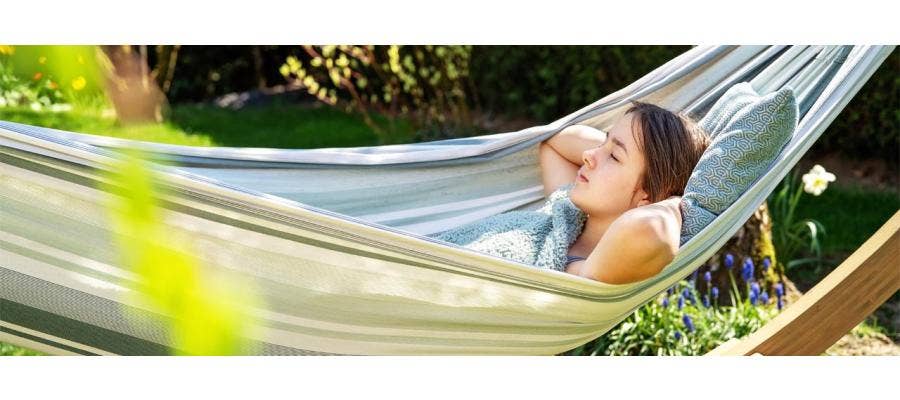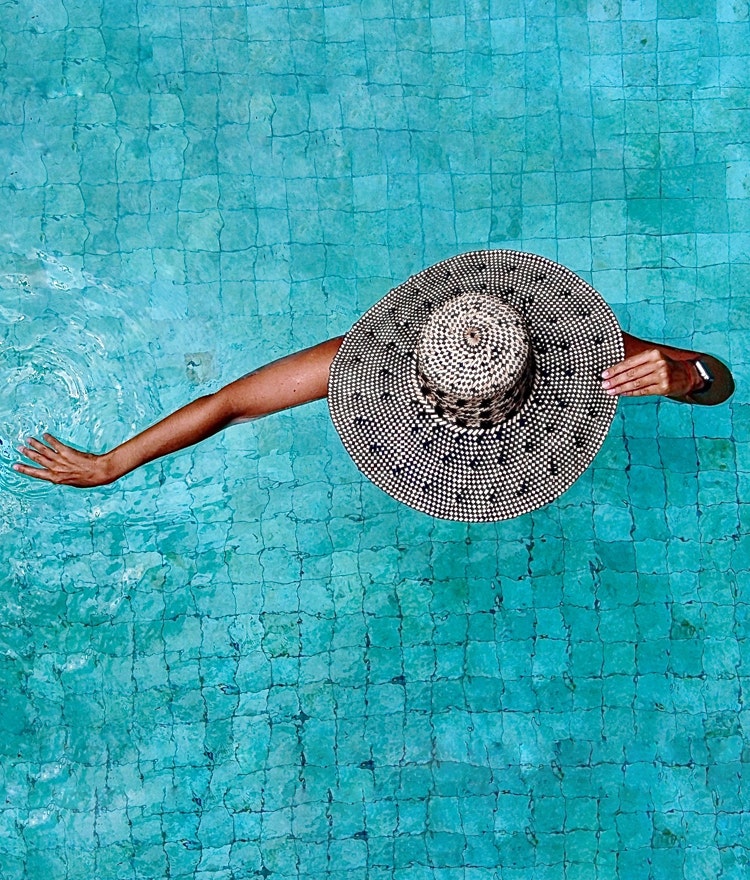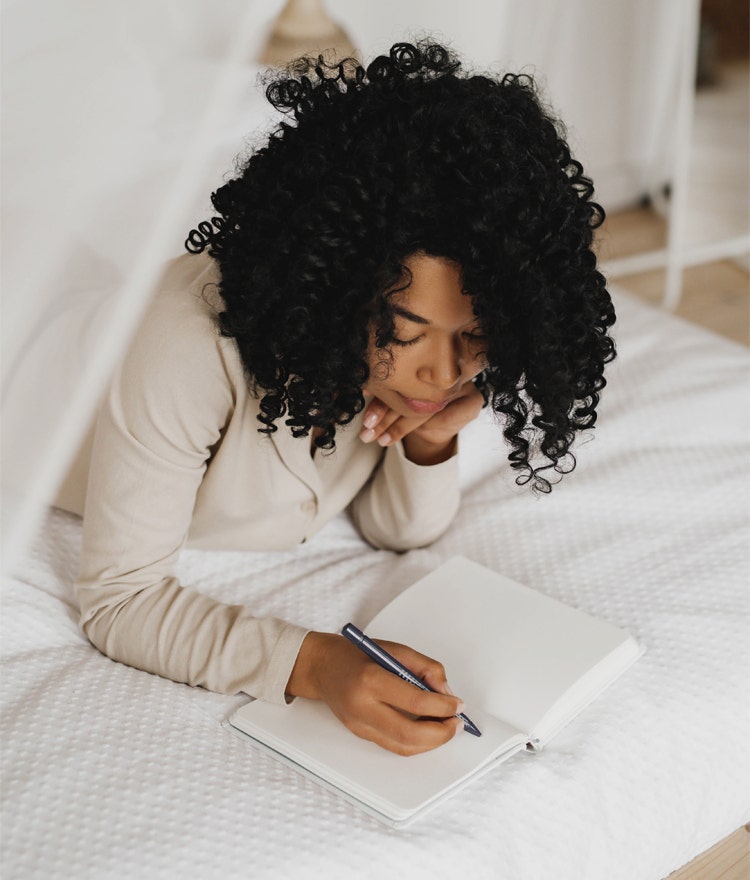
The temps are rising, the patios are filling up and the dog parks are bustling. All signs that our old friend, summer, is getting ready to make its annual appearance! For those of us in the northern part of the world, summer also brings more daylight hours.
Of course, those longer daylight hours often mean more time to socialize, exercise and indulge … all of which can lead to a disrupted sleep schedule, no matter how comfy your mattress is. You might also chalk up your poor summer sleep to the kids being out of school or the hot, humid weather.
All of these may play a part in why you struggle to sleep in summer, but there is an actual science as to why your sleep schedule suffers during the summer months. In fact, you may not even feel like you’re suffering – you may actually need less sleep.
Let’s break down the “why” of your summer sleep schedule and then we can cover what you can do to restore some balance and give your mind and body the restorative sleep you need … even when the sun and fun are calling your name.
The science of summer and sleep


We all have an internal clock called our circadian rhythm. You’ve probably heard of it, even if you aren’t super sure how it works. Your circadian rhythm is what controls your wake-up and go-to-sleep patterns in a 24 hour period.
Humans are not the only ones whose sleep is regulated by circadian rhythm. In fact, most living beings share this with us, which is all the more reason we should feel connected to our one beautiful planet.
So how does circadian rhythm make you sleepy – or not, as the case may be? Your body’s clock responds to certain indicators like temperature and light to help tell it when it’s time to catch some Z’s. In the simplest of terms, when your eyelids catch the sunrise in the morning, this sends messages to your brain that it is time to wake up. When it is dark, the same thing happens to let your body know that it is time to rest. There’s more to it, but you get the gist.
Your natural hormones: melatonin and cortisol
You’ve probably seen melatonin supplements for sleep before, but what you may not know is that we create melatonin naturally. Melatonin is a hormone that makes us sleepy. On the flipside, we also create the hormone, cortisol, which tells us that it is time to be awake and alert.
In a perfect world, our bodies would create a lot of cortisol in the morning and a lot of melatonin before bed. However, in summertime, those longer daylight hours and humid temps can send some mixed signals (and the opposite happens in winter.) The more daylight we see, the more our bodies push off the melatonin hormones and continue to tell us to stay awake. Hello, sleepless nights.


It’s getting hot in here… but it should be cool
Temperature can also play a big role in how well you sleep. Love the sunshine, especially poolside? Us too! But, being a sweaty mess or having sunburn are not the best way to get a good night's sleep.
The best temperature for sleep is actually between 60 and 67 degrees! So if the AC isn’t blasting, it’s likely warmer than that in your bedroom. When your body get too warm, this signals your brain subconsciously to be aware so that you can try to regulate your temperature, which is kind of your brain, sure, but doesn’t make for a solid night's sleep.
The skinny on Vitamin D
Vitamin D supplements are also a popular wellness purchase. Not sure exactly why? Especially considering we make Vitamin D naturally when our skin is exposed to the sun?
For starters, Vitamin D is crucial for our immune health, our bones and is even known to help with cancer prevention, which certainly explains its popularity. Plus, factor is that nearly half of adults are deficient in Vitamin D. It unfortunately isn’t something that’s easy to obtain through diet, and for those of us living in areas where sun exposure is limited or seasonal, the chance of being deficient increases.
So why are we talking about Vitamin D? There is a correlation between Vitamin D deficiency and negative effects on sleep quality and your overall mood. This is why Vitamin D is VERY popular for those of us who suffer from the wintertime blues.
We know what you’re thinking… we’re talking about summer sleep, and we get lots of sunshine exposure in summer. Why would I need a Vitamin D supplement in the summer? Just because the sun is out doesn’t mean we’re out in it enough to provide the amount of Vitamin D we need for our bodies to thrive.
Right… so do I need a Vitamin D supplement?
That little bit of extra summer sun exposure you may be getting is beneficial, but may not be enough to combat poor sleep. Whether or not you’re currently supplementing Vitamin D, here are a few things to consider:
- Are you deficient? How much should you be taking? Does this amount change seasonally based on where you live? These are all GREAT questions to discuss with your doctor to ensure you’re getting the amount of Vitamin D you need.
- Are you taking Vitamin D with food? Vitamin D is fat soluble which means that it should be taken with certain foods to ensure the best absorption of the supplement.
- Have you analyzed your diet? Are you eating foods that contain Vitamin D (mushrooms, egg yolks, cheese, salmon are a few examples). These are good to mention to your doctor as well.
- How much sun are you getting? Are you wearing sunscreen when you’re in the sun? How long are you in it and where? Why do these things matter? You cannot get the Vitamin D benefits of sunshine through a glass window or with sunscreen on.
The takeaway? Vitamin D is important but you should talk with your doctor first about your individual needs.
Additional summer sleep hacks


Outside of Vitamin D, here are a few more things to consider implementing to help you get the Z’s you deserve:
- Temperature: Keep the temperature of your bedroom in that 60 to 67 degree zone by using the AC or opening up the windows for a cool breeze. You can also utilize a fan to help your body regulate your temp while you sleep.
- Sleep schedule: Late nights happen but if you’re going to bed super late a few days a week, it is enough to make you feel jetlagged during the day. The more structure around your sleep, the more your body adapts to that schedule, and the better sleep you will get.
- Screen time: Turn off the TV, put down the phone, and opt for a book instead or journal to start relaxing. The less blue light you’re seeing heading into nighttime, the better for your circadian rhythm.
Plus, a Happsy organic mattress, of course!
Comfort is HUGE for a good night’s rest and knowing you’re going to bed without the toxic chemicals helps a mind rest easy. Plus organic mattress materials are inherently more breathable than petroleum-based foams that make you feel hot and sweaty. Getting a Happsy organic mattress may just be the summer self care you need.
Everyone is different, and some sleep factors are simply out of your control (like the big, cuddly dog you may share a bed with!). But experimenting with the things you can do to help your body settle down at night, can be extremely beneficial for you to be your best, most rested self all summer long.
